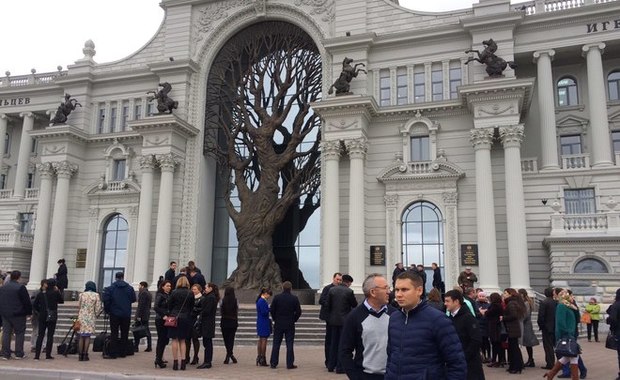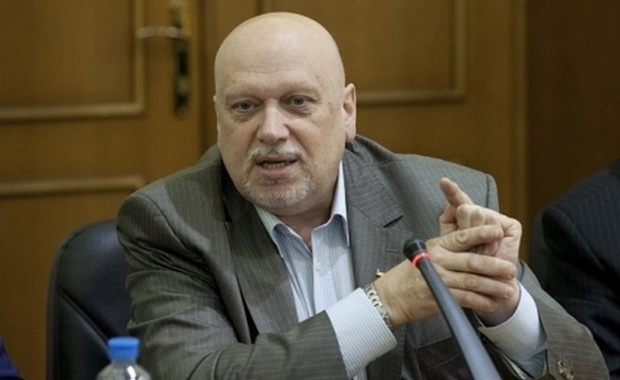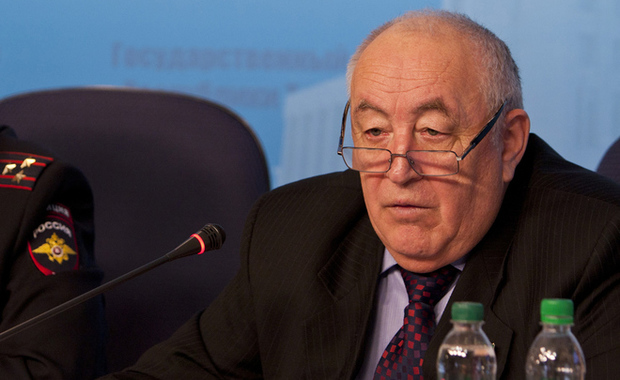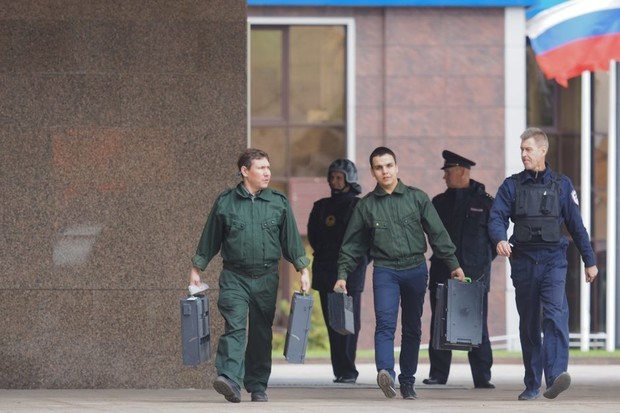Elusive ''callers'': new wave of evacuations sweeps Kazan, experts do not exclude another one
Institutions of regional and municipal authorities, schools, universities fall under the scope of telephone terrorists – how it was and what to expect next?
A new phase of telephone terrorism has recently swept Kazan: more than ten institutions of the regional government and over 30 schools were evacuated because of anonymous calls. On the background of these events, there are being talks about toughening the liability for telephone terrorism. However, fisrt it is necessary to catch the criminals before bringing them to justice, but they continue to remain elusive. Read more about the situation in the material of Realnoe Vremya.
''New wave'' of pseudominers
The first call was on 3 October at about 11 a.m. to the Palace of Agriculture, where it is located the Ministry of Agriculture and Food of Tatarstan. At that time, in the building there was the head of the ministry Marat Akhmetov. At 10 a.m., he was holding a press conference dedicated to Day of Agriculture and Process Industry Worker. All department officers of the ministry were forced to leave the building. The correspondent of Realnoe Vremya received confirmation at the security of the Palace of Agriculture that it was not a drill. Soon to the Palace of Agriculture there arrived emergency service and dog handlers to check for an allegedly planted bomb. Telephone terrorists almost immediately switched from the republican level of government to local one: along with the ministries there was evacuated the Kazan Executive Committee. Kazan IT Park was also evacuated after a telephone call informing about a bomb. Later it was also known about false mining of the Directorate of sports and social projects based in the Universiade Village.
The evacuation caught the parliamentarians as well. In the building of the Tatarstan State Council, where the work process was in full swing, there was a meeting of the Public Youth Chamber under Tatarstan State Council. State Council Deputy from the Communist Party Artem Prokofyev posted in Instagram that the evacuation didn't stop the people's representatives: as soon as they left the building they continued the meeting on the street. Later it became known that anonymous calls also affected the parties personally: the headquarters of the Communist Party and of United Russia were also evacuated.

The wave of anonymous calls spread to other pillars of the republican authorities. Becasue of the calls about a bomb, there were evacuated the department officers of the Ministry of Finance, Ministry of Youth Affairs and Sport, Ministry of Land and Property and Ministry of Education, as well as of the Republican Office of the Antimonopoly Service. Besides, Realnoe Vremya found out about the evacuation in the ministries of health, construction and transport of the Republic of Tatarstan. The officers of Tatarstan Presidential Administration in the Kazan Kremlin were also evacuated from the building. According to the sources of Realnoe Vremya, it was almost immediately reported about the situation to President of Tatarstan Rustam Minnikhanov, who at that time was on a working visit in Singapore.
The evacuation affected thousands of people, and at some point it seemed that it would be easier to list the agencies that were not evacuated.
Judging by reports in social networks, the evacuation affected more than thirty Kazan schools. In some of them after evacuation children were allowed to go home.
We will note that for ordinary citizens of Kazan the evacuation was more an adventure rather than a serious incident. The workers who left their jobs actively shared in social networks with photos of the evacuation process, discussed the work of the security services and told how they were spending suddenly free time.
Closer to 2 p.m., the emergency services began to complete checking the facilities, and the workers began to return to their work places. The Ministry of Healthcare told Realnoe Vremya that the evacuation coincided with a lunch break and did not create serious problems.
After lunch, the target of telephone terrorist shifted to higher educational establishments. In social networks people reported about the beginning of evacuation in the Kazan State University of Architecture and Engineering, the Kazan National Research Technical University named after A.N. Tupolev, the Russian Academy of Justice and some other universities.

The new wave of evacuations is not the last one?
FSB Major General in the reserve Alexander Mikhailov told Realnoe Vremya that the current wave of evacuations is the next stage in the campaign of telephone terrorists, and not the last one.
''We should understand that this will continue. The whole story has a prolonged nature. We are dealing with a mass disorderly conduct of terrorist nature,'' he commented on the current wave of evacuation in Kazan.
Nevertheless, according to Mikhailov, the pseudominers can be usual adolescents or mentally unstable people, especially that even for them it is not a problem to hide their identity when calling.
''Today half the country uses fake SIM cards!'' Mikhailov explains the difficulty with identification of the callers. ''If it is other technology, then it is even a more difficult thing. There is a chain of IP addresses, many of which are located not on the territory of the Russian Federation.''
It is possible to catch the intruders, Mikhailov says, but not only intelligence services should participate in this.
''If they (anonymous calls — editor's note) are performed by specific people on the territory of the Russian Federation, then a network of close people know about them,'' said Mikhailov. ''If we are talking about some teenagers, youth or simply paranoids-provocateurs, then they will definitely tell their network that they ''send all the Soviet power into a frenzy''. I believe that citizens should pay attention to such signals. In those moments, civil society should approve itself.

Strict punishment for Russian pseudominers and ''a response act'' for foreign ones
We will remind, earlier the mass media reported that the anonymous bomb threat calls could come from abroad. The same opinion was expressed by deputy chairman of the committee on legality, law and order of the State Council of Tatarstan Rafil Nugumanov.
''They're counting on it, they checked the first time, second. But on the third time they can actually plant… We have enough enemies,'' said Nugumanov to Realnoe Vremya. ''I think it is not ours. It is done probably from abroad. Some say it's security officers conduct exercises. But this can not be true! It's huge costs!''
According to Mikhailov, in this case, the process of catching criminals for the intelligence agencies will be even more difficult. ''But if I found out that the calls were coming from some sort of Banderites from Ukraine, we could do a return thing, it wouldn't be a picnic,'' commented Mikhailov.
Mikhailov also stated that if they caught the callers, they should be judged not only by the article on false messages about terrorist attacks but also for aiding and abetting terrorism. A similar proposal was voiced in the State Duma of the Russian Federation in September. ''By and large, they perform the same function as terrorists do — sowing discord, causing fear and terror,'' says Mikhailov.
Autumn madness
As Realnoe Vremya reported earlier, the first wave of evacuations began in Russia on 11 September and affected almost all major cities of the country. The first pseudominings took place in Stavropol and Ufa, and by 13 September the wave of evacuations reached Moscow. According to media reports, more than 400,000 people were evacuated across Russia over a week from the beginning of the wave of anonymous calls. Telephone terrorism predominantly affected large public places such as train stations and shopping centres – in total over a thousand buildings. None of the messages about a bomb threat were confirmed.

The wave of evacuations reached Tatarstan on September 16. In all regions, the police opened a criminal case under the article 207 of the criminal code — ''Intentional false report about an impending explosion, arson or other actions creating danger of destruction of people, causing significant property damage or onset of other socially dangerous consequences''.
The damage assessments from evacuations differ. On 18 September, the media reported that the Ministry of Internal Affairs assessed the damage across Russia at 300 million rubles, but later the head of the ministry Vladimir Kolokoltsev denied this information. The head of EMERCOM of Russia Vladimir Puchkov stated that the damages may exceed 1 billion rubles.